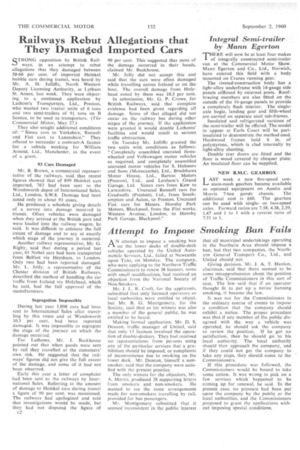Attempt to Impose Smoking Ban Fails
Page 38

If you've noticed an error in this article please click here to report it so we can fix it.
i‘ N attempt to impose a smoking ban ti on the lower decks of double-deck vehicles operated by the United Automobile Services, Ltd.. failed at Newcastle upon Tyne. on Monday. The company, who were applying to the Northern Traffic Commissioners to renew 38 licences, some with small modifications, had received an objection from the National Society of Non-Smokers.
Mr. J. L. R. Croft, for the applicants, submitted that only licensed operators or local authorities were entitled to object, but Mr. B. G. Montgomery, for the Society, said that as his witness was also a member of the general public, he was entitled to be heard.
Making formal application. Mr. D. S. Deacon, traffic manager of United, said that only 13 licences involved the operation of double-deckers. They had received no representations from persons using any of the particular services that a prohibition should be imposed, or complaints of inconvenience due to smoking on the lower deck. Mr. Deacon, himself a nonsmoke: , said that the company were satisfied with the present practice.
The only witness for the objectors, Mr. A. Morris, produced 38 supporting letters from smokers and non-smokers, He wanted to see the same arrangements made for non-smokers travelling by rail, provided for bus passengers.
Mr. Montgomery submitted that it seemed inconsistent in the public interest that -all municipal undertakings operating in the Northern Area should impose a ban, but that two companies, the Northern General Transport Co., Ltd., and United should not.
Giving decision. Mr. J. A. T. Hanlon, chairman. said that there seemed to be some misapprehension about the position of Traffic Commissioners in this sort of case. The lawsaid that if an _operator thought lit to put up a notice banning smoking, it became the law.
It was not for the Commissioners in the ordinary course of events to impose a condition that the company should exhibit a notice. The proper procedure was that if any member of the public disagreed with the_ way a vehicle was operated, he should ask the company to review the position. If he got no satisfaction, then he should go to his local authority. The, local authority should then approach the company, and if they could not get the company to take any steps, they should come to the Commissioners.
If this procedure. was followed, the Commissioners would be bound to take some action. It was wrong to pick on a few services which happened to be coming up for renewal, he said. In the present case, no pressure had been put upon the company by the public or the local authorities, and the Commissioners proposed to grant the applications without imposing special conditions.








































































































